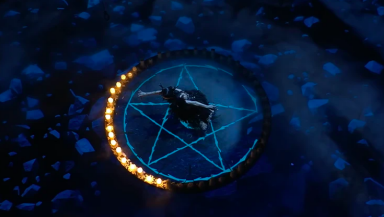
How times change! The Eurovision Song Contest began way back in 1956 as a technical experiment in television broadcasting to an international audience. It was hosted in the Swiss-Italian lakeside city of Lugano, and seven nations took part: the Netherlands, Switzerland, Belgium, Germany, France, Luxembourg and Italy. The UK was apparently too busy with its own contest and sent apologies.
Eurovision was originally, as the name implies, a European enterprise, but now contestants come from across the world, with 37 different countries taking part this year – whittled down to 26 for the final.
Back in the day it was a popular, if rather bland, affair, with anodyne songs and respectful contestants, all dressed alike in evening wear and shiny shoes. Husband and wife duo, Pearl Carr and Teddy Johnson, nailed the mood in 1959 with a chirpy little number entitled Sing Little Birdie – at the time seen as something of a departure from the more usual diet of ballads. But the adventurous gamble paid off, because it got attention and won them second place. Overall, the word 'chaste' comes to mind, and, until recently, that's been pretty much what Eurovision was all about. A jolly and undemanding evening, showcasing European solidarity. Good fun, all round!
Fast forward to 2024, and a rather different picture emerges. For a start, the contest is now global, with entrants from as far afield as Australia, Israel, and Azerbaijan, to name but a few, while the majority of competitors seem scantily clad and rather 'raunchy' – admiringly described by the BBC as ' magical and moving and weird'. There's the usual diet of throbbing love songs, of course, but at the same time many of the entries appear to have moved some way beyond that. The UK entry, for example, described as set in a 'post-apocalyptic boxing gym, aboard a space ship hurtling towards earth', has a support group of exclusively male dancers, who energetically gyrate around singer Olly Alexander, making the performance a highly sexualised celebration and promotion of gay love.
Also carrying a message, albeit rather different, is Ireland's entry. Performed by a non-binary singer with the unlikely name of Bambie Thug – described in publicity as a 'goth gremlin goblin witch' – it features what's been labelled a candlelit séance. Till ordered to remove them, Bambie also had the words 'Ceasefire' and 'Free Palestine' written across face and body in Ogham, an ancient Irish alphabet. One may conclude, given the occult tone of the whole, that Bambie Thug was attempting to cast a spell.
A far cry from Eurovision's original vision of an apolitical and wholesome songfest that would transcend political difference and draw the nations together. And the whole sorry affair has, without question, been made infinitely worse this year by the protests of pro-Palestinian supporters, demanding Israel be removed because of the continuing conflict in Gaza. Never mind the fact this was a murderous conflict started by Hamas – which could be ended overnight, if the terrorist group would only return the hostages and agree to cease hostilities – pro-Palestinian demonstrators have been unremitting in their call for Israel to be barred.
The threats of violence have indeed been so bad that Israeli entrant Eden Golan, for her own safety, has had to be confined to her room, while extra police have been drafted into Malmo, not just from across Sweden, but from neighbouring Denmark and Norway as well – all reportedly carrying larger and more powerful weapons than usual so as to meet the threat.
Feel good? No, say activists ... feel afraid.
The sad truth is, Eurovision has become a mirror for our fractured, decadent, and increasingly pagan society, all cloaked in glitz, glamour and sequins. A vehicle for interest groups to pound home their message, whether that be sexual libertarianism, good old-fashioned anarchy, or attempted political manipulation and control.
So here's a thought, for the future let's forget misplaced attempts to rebrand world culture and score points, and instead concentrate on just celebrating music and having a good time.
Rev Lynda Rose is founder of Voice for Justice UK, a group which works to uphold the moral values of the Bible in society.













